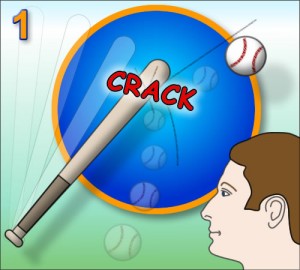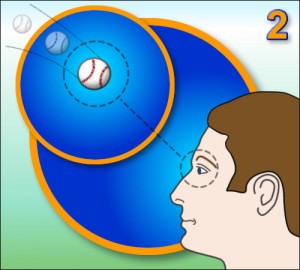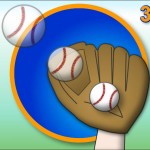What I learned in Behavioural Science class (wk 2)
Wow, I’m really excited about all of the cool stuff I’ve been learning in school this week. I thought, rather than posting all of my homework assignments I would just pick one that was the most interesting. I don’t want to annoy people with floods of writing!
————————
The seemingly insignificant act of hearing and seeing a baseball hit by a bat, moving to catch the ball and then catching it in a glove actually requires the use of almost every part of our brain!
 First we see and hear the ball being hit by the bat. The sight of the bat about to strike the ball is first registered in the Occipital Lobe inside the Cerebral Cortex. It’s possible that these images are also processed by the temporal lobe. Next the sound from the bat would arrive and would be processed by the Temporal Lobe. At this point another function of the Temporal Lobe would also kick in which is motivation so that the rest of the body and brain will be motivated to expend the energy necessary to catch the ball. This in turn would cause the Medulla to start preparing the body for some potential stress of moving by altering the respiration, heart rate and blood pressure. A goal in the Frontal Lobe has now been set to catch the ball.
First we see and hear the ball being hit by the bat. The sight of the bat about to strike the ball is first registered in the Occipital Lobe inside the Cerebral Cortex. It’s possible that these images are also processed by the temporal lobe. Next the sound from the bat would arrive and would be processed by the Temporal Lobe. At this point another function of the Temporal Lobe would also kick in which is motivation so that the rest of the body and brain will be motivated to expend the energy necessary to catch the ball. This in turn would cause the Medulla to start preparing the body for some potential stress of moving by altering the respiration, heart rate and blood pressure. A goal in the Frontal Lobe has now been set to catch the ball.
 During this preparation process our subject is monitoring the ball’s direction, speed and velocity as well as also utilizing the Parietal Lobe’s spatial and mapping functionality to try to predict where the ball will come back down. This way the body can move to the proper location and not need to dive or slide to catch the ball. Efficiency is of key importance is most of the brain’s operations.
During this preparation process our subject is monitoring the ball’s direction, speed and velocity as well as also utilizing the Parietal Lobe’s spatial and mapping functionality to try to predict where the ball will come back down. This way the body can move to the proper location and not need to dive or slide to catch the ball. Efficiency is of key importance is most of the brain’s operations.
 Next, the Cerebellum will utilize its ability to control movement to get the subject walking or running over to where it believes the ball will be landing. After getting into the right position the Cerebellum will use another function to adjust reflexes and balance for the entire body to ensure that the subject does not fall over or drop the ball. After the ball is caught the Medulla will begin sending signals to the body to let it know that it can now begin relaxing.
Next, the Cerebellum will utilize its ability to control movement to get the subject walking or running over to where it believes the ball will be landing. After getting into the right position the Cerebellum will use another function to adjust reflexes and balance for the entire body to ensure that the subject does not fall over or drop the ball. After the ball is caught the Medulla will begin sending signals to the body to let it know that it can now begin relaxing.
As you can see from this short description almost every portion of the brain is utilized during this process. Hopefully this gives you a view into how diverse, flexible and powerful the human brain really is.
read morePanoramic Monsoon Sunsets From Tucson Arizona
I don’t tend to whine a lot, but when I do it’s usually about being hot. I have a lot of energy and it usually manifests itself as sweat! Luckily Tucson has the most amazing sunsets during the hottest and most humid time of year. These help me ignore that I can’t stop sweating unless I’m hiding inside with the air conditioning set to 75.
Here are a few panoramic photos I took from my house that show of one of the things that makes Arizona an amazing place to live! These were shot with my iPhone and stitched together using AutoStitch.
Be sure to click to see these larger!
read moreWhat I learned in school during week one
As some of you may or may not know I decided to return to school and try to finish off my degree in Business Administration. It’s pretty crazy to look back and see that it’s been almost 7 years since I last attended classes. In an effort to try to get the best grades possible I thought it might be an interesting experiment to post the output from my classes here on the blog. It actually forces me into a different mental state where I am not only writing for the teacher, but to ensure that what I’ve learned is clear for my readers as well. Please let me know what you think so I can get even better.
Week 1 learning summary:
BEH 225 – Introduction to Behavioural Science
Psychology was not considered to be a formal discipline until 1879 when Wilhelm Wundt from Germany setup the first laboratory of psychology. Prior to this time, it was considered to be a discipline of philosophy. Because of these differing perspectives psychology has taken many paths over its young life, and is an extremely large umbrella under which hundreds of disciplines are covered.
In believe that the rise of cognitive psychology in the 1960s has had a larger impact on psychology than any other sub-field. The primary reason for this belief is that cognitive psychologists were actually able to expand the definition of psychology which firmly supports my belief. Additionally, I feel that neuroscientists in the future will be able to answer many of the “black box” questions that have been eluding psychologists for many years.
I also see the power of cognitive psychology in my every day work for Intuit’s customer care department of Turbotax. As a team we continue to try to better understand our customer needs during extremely busy tax seasons by utilizing voice of the customer (survey), “follow me home” (naturalistic observation), case and mock-case studies to help us try to understand which key levers we can pull to effectively impact our key business outcomes (correlational research).
I look forward to learning more about the field of psychology and how I can use the scientific tools to better understand my current and future customers. Additionally, I would like to understand more about neuroscience as I believe that it holds the keys to many currently locked and other yet unidentified doors in science.
ETH 125 – Cultural Diversity
Before reading this first chapter of the book I thought I had a clear understanding that race was effectively just skin color or the continent that someone was from, but now I realize that I was very incorrect. I have often interpreted the terms almost interchangeably, which I believe is what many people do every day.
Due to the rapid growth of the world population, it is imperative that everyone has a clear understanding of the differences between these terms. By the year 2020 it is estimated that the population of China will outnumber that of the United States, Canada and Mexico. If we do not come to terms with the underlying issues we run the risk of finding ourselves assimilated by another group just due to them viewing us as ignorant.
For me personally it is hard to turn off my analytical side which wants to constantly categorize and bucket people. Between my daily work, school and social activities I do consistently interact with people of various races and ethnicities. It is human nature to assume that you know how someone will behave, but once you get to know them you typically find out that you were nowhere close. I’ve had many situations in my past where I’ve been pleasantly surprised, but it’s important to be sure that you’re adopting a very open mindset and approaching these situations as a chance to learn from the other person.
read moreWhat is Innovators Mix?
I’m sure that lots of my readers out there are wondering what all of this noise is about Innovators Mix over the last month or so. Well, this is my attempt at explaining it.
- Learn more about innovation and creativity – As with all things, the more you learn about something the more you realize that you don’t know much! I would really like to be able to get to the point where I can call myself an expert in the field.
- Teach Others – This podcast allows me to not only learn, but teach others at the same time.
- Build my personal brand – By surrounding myself with experts in the field I will slowly build my personal brand through them.
- Network – I’ve read in many places that you should always surround yourself with people that are better at something than yourself. What better way to accomplish this than to sit down and talk with those experts directly!
- Write a Book – Eventually, I would like to be able to take all of these things and write a book. While today I don’t think that I have the right skills, I think that lots of practice and the right mentors would definitely get me there in the future.
- Take it to the schools – My long term vision with this project is to be able to put together content that can be utilized in elementary schools. By teaching children creativity, brainstorming and ideation techniques they will be setup for success in the future.
I hope this helps clarify what I’m trying to accomplish, please leave me your thoughts and feedback below!
read more2009 New Years Resolutions In Review
Last year I posted what my resolutions were for the year. I feel like I did make progress on them, but they were not completed. I think this year I need to make a few of the goals a little more concrete as well as make sure they are incorporated into my GTD horizon planning.
Here is a quick review of how I did on the goals I posted last year…
- More time for family – Last year I promised that I would not miss out on any birthday parties, family events or small get-togethers unless there is a dire emergency that requires my attention. I feel like I did pretty good with this goal. I think the only area that I neglected was some of my friends. I feel like I did skip quite a few “going out” nights with friends, but I did make most of the family events and birthday parties. I also made time for a few trips out of town with the girls which were tons of fun. Additionally, I was able to help with taking Miranda to softball lessons and other events which I don’t think I would have made appropriate time for previously.
- Get my home businesses moving – This resolution ended up being adjusted mid-year. We did focus on the home businesses quite a bit, but from discussions with mentors as well as reading some new books I decided that it was not a good idea to focus so heavily on these for now. I needed to find a business that would allow both Maria and I to do things we are already good at, rather than focusing on learning new skills at this point.
To support this I’ve been helping a friend get his software development company going which aligns with my skills. Additionally, Maria and I have started Atrevete! which aligns very well with her skills. From a financial perspective we are probably in a similar position to where we were this time last year, but we’ve got a better handle on where we’re going which feels great.
- Drop 15 pounds – I did ok on this goal at the beginning of the year, but in June when I began implementing the Getting Things Done methodology and properly tracking my progress I realized that I was way behind where I wanted to be. I have been able to keep myself at about 190 pounds which is only about 5 pounds short of my goal. It feels great to have gotten into an exercise habit which also gives me time to listen to lots of podcasts and learn plenty of new things.
Getting this exercise plan in place has also helped me to realize that I was gaining most of my weight through alcohol. Sometime in late July I got a really bad gout attack and decided to see if the attacks were related to the alcohol. I pretty much stopped drinking at that point. Since then I’ve only had drinks on special occasions and have been doing a decent job of keeping those to only a drink or two. I plan to continue this pattern during 2010 as well.
- Increase my Spanish skills – I was pretty vague about this goal and my current Spanish skills support that comment as well. I did take a Spanish class for a few weeks, but the timing was terrible and I ended up having to stop it. I have been practicing using Rosetta stone a little bit as well as listening to a Spanish podcast. Since we’ve been in Mexico for the last week I’ve definitely noticed that I understand quite a bit more than before and I’m able to have small conversations here and there. I definitely need to continue practicing and try to get more fluent…
Now I have to spend some time figuring out what I want to accomplish for 2010…
read moreImplementing Getting Things Done
As many of you may already know I am an avid social network user. I have my cell phone and instant messenger programs connected so I can quickly type a short blurb and have my statuses, tweets, and profiles all updated in a few quick seconds. I tend to lean toward sending an answer to “What are you doing now?” for most of my updates.
A month or two ago I sent what I thought was an innocent status update. “Working like crazy to get lots of things done before I head home from the office…” One of my co-workers caught this on Yammer and soon replied with a link to Wikipedia and told me that maybe this would help. It certainly has.
After reading the book and doing a little research online I decided I needed to try to implement this system for myself. Being the nerd that I am, I could not see using paper, file folders and desk drawers. I needed to be completely mobile enabled. I have implemented GTD this way:
2 Day mind sweep / gathering – I began by going through my house with a notepad and just listing everything around the house that I wanted to do. After this I headed to my office and did the same. Next was my personal e-mail box.
Turned off Outlook notifications – One thing that I realized through this was that Outlook was seriously distracting me. Even when I was doing the gathering exercise above I continued to be distracted with new items. I turned off the sounds, pop-up notifications and tray notifications so that I have to manually open outlook and click my inbox to be able to see new messages.
MyLifeOrganized – I found this great program which allows me to keep ALL of my projects and tasks organized by context, synchronized between computers as well as my cell phone. This definitely satisfied my nerdy side.
Weekly 2 hour review – I honestly thought David Allen was crazy when he suggested that you set aside at least 2-3 hours each week to regroup on everything. I believe what he suggests is actually too little time for most people. I blocked off 2 hours every Friday afternoon to review everything and prepare for the weekend. I constantly find myself running out of time or needing some extra time for this on Saturdays. You should definitely take this seriously and make sure you have proper time to review. It will pay off big time!
David Allen describes a nagging feeling that’s always in the back of your mind when you don’t get it all out of your head. I can definitely identify with that. Since using this methodology I definitely feel that I am more in control of my destiny. Each day I feel that the things that are most important are moving forward. I’m even receiving compliments from friends, family and co-workers that I seem to be more on the ball lately.
Personally, I love that all of my inboxes are clean and I can keep my desk much neater. Turning off notifications in my Outlook has allowed me to focus better and not be distracted by all of those electronic interruptions. It’s great to be confident that if I tell someone I will do something for them, it will get done. It may not be this moment, but I will eventually get to it.
I am definitely an infant when compared to folks that have used this methodology for years, but I know that with practice I will eventually get to the “mind like water” state that’s described in the book. The areas that seem to trip me up so far are fairly minor. Many times I look at my list of tasks and still feel a little overwhelmed by the length of the list. My natural tendency is to want to clear the entire list. This is definitely not possible and sometimes that causes me to need to remind myself just to focus on what’s most important.
Initially I had a difficult time making sure my list was updated whenever I got a call or e-mail. I would need to spend a large portion of my weekly review time looking at my sent items and call histories to remind myself of which items needed to be added to my “Waiting For” list as well as adding follow up calls to my list.
All-in-all I’m extremely happy with the results of implementing this methodology and I look forward to continually growing in this area to the point where I can help guide and mentor others so they can reap the same rewards.
More again soon….
read more






Connect With Me